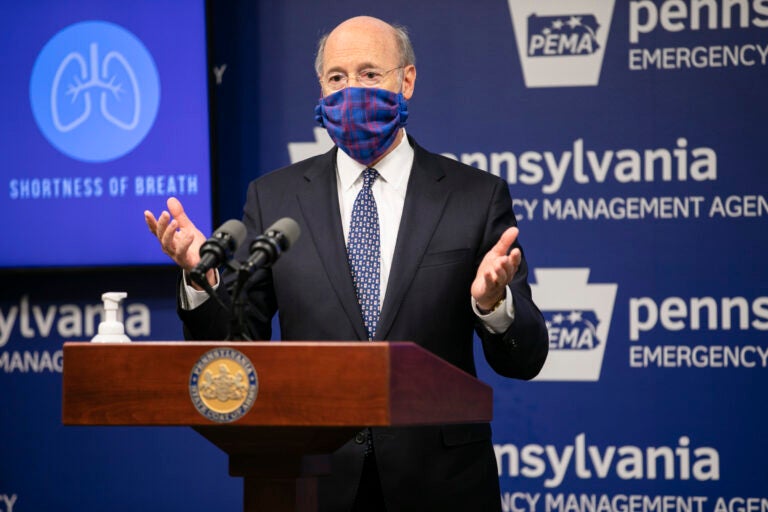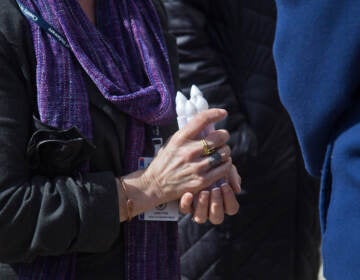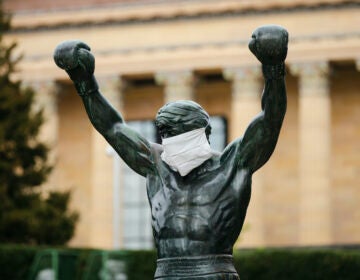Pa. coronavirus recovery: Wolf makes an economic plea for masks in businesses
The Pennsylvania Board of Law Examiners decided to postpone the state’s bar exam a second time, and conduct it remotely over three days in October.

Pennsylvania Gov. Tom Wolf addresses reporters at a press conference in Harrisburg. (Office of Gov. Tom Wolf)
Are you on the front lines of the coronavirus? Help us report on the pandemic.
Updated 4:15 p.m.
On Friday, the Pennsylvania Department of Health reported 93,876 coronavirus cases since the coronavirus pandemic began, and 6,880 deaths.
Philadelphia’s Department of Public Health has reported 27, 341, cases and 1,629 deaths as of Friday.
Wolf makes an economic plea for masks in businesses
Gov. Tom Wolf is once again imploring Pennsylvanians to wear face masks, this time as a means of keeping local businesses healthy.
“Pennsylvania businesses have made significant sacrifices over the past few months and now they are relying on us as consumers to help keep their doors open,” Wolf said in a statement released Friday. “Wearing a mask protects everyone from the virus and shows our respect and support for businesses and their employees.”
An order signed by the state’s health commissioner on July 1 made it mandatory for residents to wear masks outside of the home.
Wolf and his deputies are asking any business offering in-person services to follow those rules, and steering them to a comprehensive set of recommendations for how different industries can help mitigate virus risks. The state has laid out operating protocols for businesses ranging from banks to barbershops, spelling out what is permitted and best-practices for reducing transmission.
“Workers and customers must wear a mask when working, shopping, and dining, and employers should provide workers with masks who need them,” the release states.
State officials stress that in order for small and local businesses to safely operate, customers have to feel safe and healthy patronizing them.
For prospective lawyers, bar exam moves online
This week, the Pennsylvania Board of Law Examiners decided to postpone the state’s bar exam a second time, and conduct it remotely over the course of three days in October.
According to a letter to bar exam stakeholders, the board initially pushed back conducting the in-person exam until the fall, in the hopes that the coronavirus situation would by then have settled down.
“The best information from health authorities now compels us to conclude that it is unlikely we could do so,” board chair David Fine wrote in the letter.
For prospective lawyers, it means substantial adjustments in how the exam will be administered.
The essay section will be split across two days, Oct. 5 and 7. The multistate bar exam will have just 100 multiple-choice questions, half of the usual 200. And there will be more breaks to accommodate “security measures attendant to a remote exam.”
Anyone who was registered for the earlier exam dates is automatically set for the new October dates.
“Ultimately, we concluded that this is the best option to meet our mission of protecting the public,” Fine wrote, adding that board had to weigh keeping proctors and staff safe, in addition to offering exam-takers the safest array of health options.
West Chester University to stick with remote classes in the fall
A large public university in Chester County announced its upcoming fall semester will be mainly online.
West Chester University says the decision is based on the number of coronavirus cases spreading across the country.
“WCU cannot ignore the potential danger of bringing thousands back to campus,” wrote university president Christopher Fiorentino.
“My leadership team and I have made the decision to continue remote learning through the fall 2020 semester, with a few courses delivered in a hybrid format, meaning both in-person and remote,” Fiorentino said.
The hybrid format is meant to facilitate learning among student teachers, those with clinical placements, and site-specific internships, among others.
The university is making arrangements to partially open on-campus housing for select students, which will include added health and safety precautions.
WCU is also modifying tuition costs in some instances, including for undergraduates “six ‘free’ Fall credits during the upcoming 2020-2021 Winter or Summer sessions.”
Most of the university’s public buildings will be open, but operate at just 50% capacity. Other modifications include more outreach by faculty advisors, a technology lending program, and a remote library lending model that includes “the mailing of library materials to students’ homes.”
WCU serves more than 17,000 students, the majority of them undergraduates.
Fiorentino also announced a town hall meeting for students and families on July 16, and another for employees on July 13.
WHYY is your source for fact-based, in-depth journalism and information. As a nonprofit organization, we rely on financial support from readers like you. Please give today.



![CoronavirusPandemic_1024x512[1]](https://whyy.org/wp-content/uploads/2020/03/CoronavirusPandemic_1024x5121-300x150.jpg)



